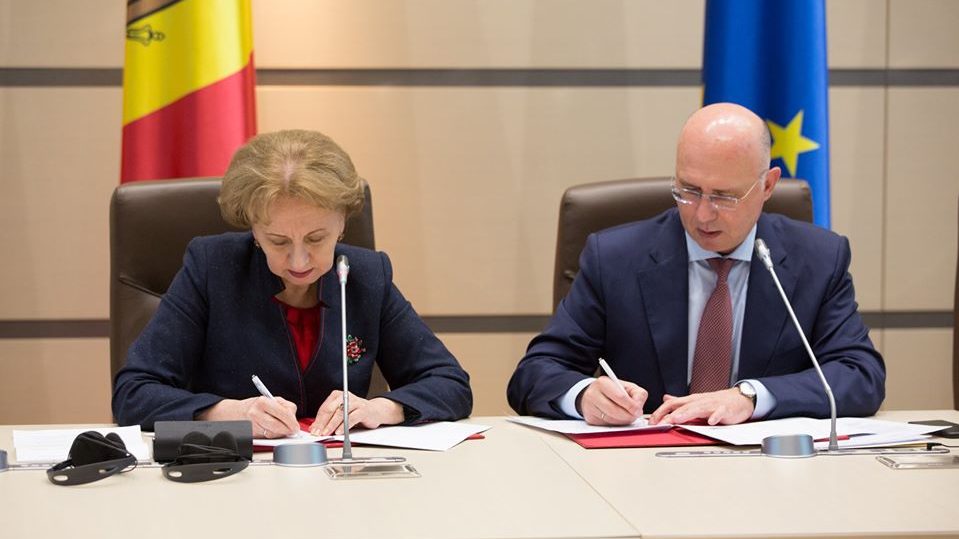By Marina Gorbatiuc (Institute of Legal, Political and Sociological Research, Chisinau)
In spite of the “Red Code” declaration and 23 infected persons on March 16th, 2020 a new Coalition government was created in Moldova. We can highlight three reasons of its forming:
1. The Coalition was established responding to President Igor Dodon’ interests, especially in view of next autumn presidential elections.
2. PSRM (Socialist Party) fearing PDM (Democratic Party) for not participating in the motion of no-confidence. So now PSRM ensured its support (so-called “home front”).
3. PDM wanted to be back in power and take their part in the State cake.
After the fall of Maia Sandu’s cabinet on November 12th, a new (minority) government was created on November 14, 2019 with the parliamentary support of PDM, which required that their politics and programs were resumed: namely, “good roads”, “doctor for you”, “starter flats”.
On March 16th an Agreement was signed between these two parties and PDM received five Ministries (Cristina Lesnic will hold the position of deputy prime minister for reintegration, Oleg Tulea – the one of foreign affairs and European integration minister, Alexandru Panzari – the office of defence minister;while the Education, Culture and Research Ministry will be led by Igor Sarov and the Economics and Infrastructure Ministry by Sergiu Railean). It focused on infrastructure development and social policy activity. But COVID-19 Virus has its own peculiarities and they will be difficult to implement. Therefore, the non-formal majority became a formal (Agreement signed) one. Changing the form of cooperation has benefited both parties as well as the President Dodon, who is preparing for next presidential election set by the end of 2020 (Dodon is the informal leader of PSRM).
Each of the parties pursued its own objectives:
– President Dodon wishes to demonstrate freedom of actions and his power as a leader. His actions are effective, and his strategic objective is to transform the political regime from parliamentary into presidential;
– PSRM should help its informal leader and introduce into practice its program tasks,
– Fearing that PDM may support a motion of no-confidence vote. PSRM thought it would be wise to share power with them;
– After losing power, the PDM is going through a difficult process of rebuilding, and exercising power again might help to strengthen internal cohesion. PDM remains a “personnel” party, still including many managers and public officials within first (municipal) and second (regional) state levels, which had come to this party because it was the “party of power”.
The current government coalition, which is supported by 59 of the 101 deputies in the National Assembly, might be able to last until the beginning of 2023 when new legislative elections are due, depending on the result of this autumn presidential elections.
This unnatural political marriage (PSRM being a pro-Russian party, and the PDM and pro-European one) is determined by the circumstances of the moment, although pretty much all political alliances in Moldova during the last decade have invoked the need to save the nation from doom. The problem, however, it that all citizens will have to bear the social-economic consequences of this “political experiment”.
Some Moldovan experts have also expressed their point of view about situation in the Republic of Moldova. Anatol Moraru noticed in his article Coalition and elections during the plague: “By the way, responding to the request of the Central Electoral Commission, Igor Dodon didn’t see anything criminal in the conduct on March, 15 2020 in Hînceşti elections, although two outbreaks of virus were recorded in the villages of Bălceana and Sofia”. This, of course, prompted the opposition to harshly criticize Dodon.
Let’s get this straight. The new parliamentary elections in the single-member constituency (SMC) no. 38 from Hincesti on March 15th, 2020 were held and were won by Socialist candidate Stefan Gațcan with 5539 votes, followed by Olesea Stamati (PAS) with 4554, Ion Mereuță (PDM) with 1810, Grigore Cobzac (independent) with 1792 and Dorin Chirtoaca (Unirea) with 346 votes.
The President of the Security and Global Association Experts Angela Grămadă in her interview for Radio Europa Liberă Moldova considers that the timing of the agreement or coalition between PSRM and PDM was not exactly appropriate because citizens were waiting entirely for other measures that the authorities would take during this very complicated period.
PDM is trying to demonstrate that can take and share responsibility, especially in sensitive areas where PSRM appears not to cope and not convince partners outside the country: for example, Romania, the European Union and a small part of Ukraine.
The situation with COVID-19 Virus is getting worse every day and the Parliament was adopted Emergency Law №127 on March 17th, 2020. The way the Government presented itself in Parliament to demand the establishment of a state of emergency shows a lack of professionalism, and also the fact that it is not ready to meet the challenges that are to be resolved. Viorel Cibotaru, the security expert in the article for Radio Chisinau mentioned that the Government has not put forward any plans to mitigate the impact of the pandemic, measures to mitigate the negative consequences for economy and people. We can confirm that in this case public confidence is low and incompetence could lead to abuse. And now many citizens are concerned about their security.
Photo source: https://balkaninsight.com/2020/03/16/moldova-govt-reshuffle-cements-socialist-democrat-alliance/


